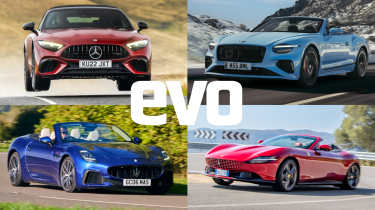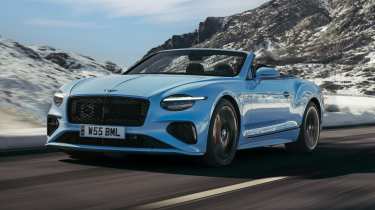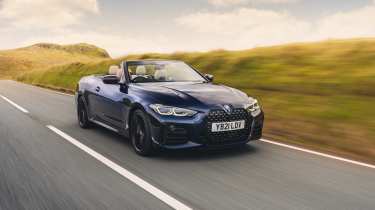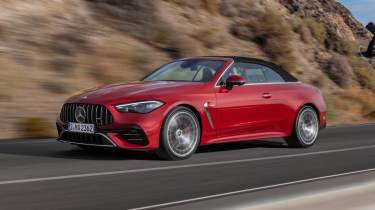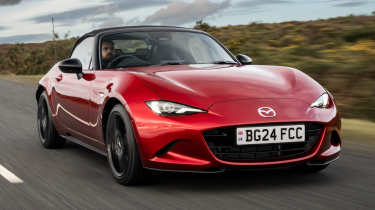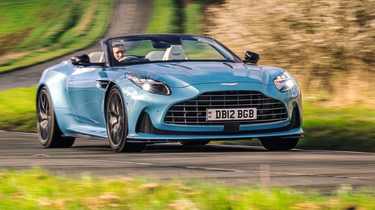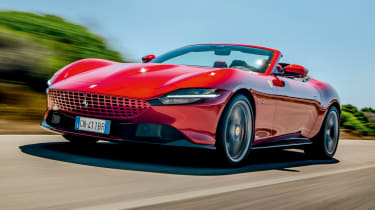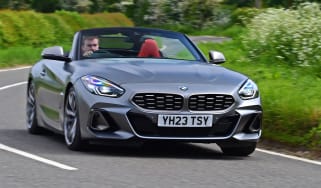Best convertible cars 2025 – evo's favourite open-air thrillers
There's nothing quite like an open-top performance car – these are the best of the current crop
The market for soft-top cars is shrinking, or at least, the manufacturers offering convertibles and cabriolets are becoming few and far between. That’s bad news for us UK motorists who, despite the awful reputation the weather has over here, absolutely love a convertible. The good news is that there are still enough companies who are willing to cut the roof off their cars to create something magical for those days when only a soft-top will do.
Buying a convertible sports car used to be a minefield of shimmying mirrors and scuttle shake, but when engineered well can offer an even more thrilling experience, bringing you even closer to the sights and sounds of a great drive. These are our favourite ways of enjoying the British sun (when you can at least), roof up or down.
Best convertible cars 2024
- Maserati GranCabrio
- Aston Martin DB12 Volante
- Ferrari Roma Spider
- Bentley Continental GT Speed
- BMW 4-series Convertible
- Mercedes-AMG CLE Cabriolet
- Mazda MX-5
- Mercedes-AMG SL55
- Porsche 911
Bentley Continental GTC Speed
This is the first foray into the hybrid era for the Bentley Continental GT with the 4-litre V8 being paired with an electric motor. It’s a mighty potent combination with 771bhp and 738lb ft of torque in the Speed model, but then again, with 2636kg to haul around the Continental GT Convertible needs all the help it can get.
It’s a heavily revised model rather than being completely new, but the new hybrid drivetrain suits the GTC’s character well. It starts off in electric mode and wafts you around serenely but awake the engine and you’re treated to a melodious V8 soundtrack and some serious performance. The advantage of the convertible over the coupe is that with the hood down you have more of an opportunity to hear the V8 strut its stuff.
Despite its weight it stops well thanks to 10-piston front callipers and while the steering isn’t the last word in feel the GTC’s four-wheel steering does add to its feeling of agility which is impressive for what is essentially a luxury GT. It retains its continent-crushing abilities but do bear in mind that the hybrid system does steal some of its boot space.
> Bentley Continental GT Speed review
BMW M440i xDrive Convertible
What’s this then, an M Performance model muscling into a best convertibles listing ahead of the full-fat M4? We’ll whisper it, but in soft-top form the M440i xDrive is a better machine than the M car. And you’ll save in the region of £23,000, too. The junior M might lack some of the visual drama of the M4, but it’s still quick (0-62mph in less than five seconds) and its less frenetic nature suits open air motoring far more than the more focused M.
The 4-series drop top can be had with a four-cylinder motor in the 420i and 430i, but the B58 straight-six in the M440i is worth paying the extra for as it sounds sublime and allows for very swift progress when required. However, as with the vast majority of convertibles it’s at its best when the pace is notched back a peg or two. Enjoy the sights and the sounds and the relatively supple ride quality.
Being based on a coupe the M440i xDrive is a pretty practical proposition, although those in the back will get somewhat blown about with the hood down. The four-wheel drive offers security when the conditions take a turn for the worse and the fabric hood offers decent refinement when it’s raised. All in all, the M440i Convertible is a great allrounder.
> BMW 4-series Convertible review
Mercedes-AMG CLE53
Gone are the days when there was a plethora of coupe and saloon-based cabriolets to choose from and these days your choice is more or less restricted to the BMW 4-series and the Mercedes CLE. Sitting at the top of Stuttgart’s range is the AMG CLE53 and it offers a rapid but not frenetic take on the genre.
We’ve still got six-cylinders here and they develop a reasonably healthy 443bhp and 443lb ft of torque, enough for a 4.4sec 0-62mph time. As part of the package you also get four-wheel drive, rear-wheel steering and AMG’s Ride Control adaptive dampers. What you don’t get is a fire breathing AMG that we remember from the V8 days, the CLE incarnation being a somewhat more sophisticated machine.
It's certainly quick and will dispatch any given stretch of road at speed, but it’s not quite as rewarding to drive as we’d hope. It feels heavy and its controls aren’t hugely communicative, but back off a notch or two and it makes more sense. The chassis delivers decent ride quality and refinement and the stiff structure doesn’t suffer from scuttle shake when in cruise mode. View it more as a rapid GT than a sports car and it makes for a great convertible choice.
> Mercedes-AMG CLE Cabriolet review
Mazda MX-5
There aren’t many sports cars that have been at the top of their game for 35 years but the MX-5 has done just that. Yes, some incarnations have been better than others, but for those wanting an affordable, lightweight and entertaining convertible it’s always been in contention. And that’s especially true of the latest machine, especially after its 2024 facelift. It’s so good that its targa-roofed RF sibling came very close to winning eCoty 2024.
At the little Mazda's heart is an incredibly simple formula – a naturally aspirated four-cylinder (now good for 181bhp and a 0-62mph time of 6.5sec in 2-litre form), a snappy manual gearchange, a limited slip diff and a suspension set up with plenty of compliance. It works wonderfully well, involving the driver like few other machines, no matter their price point.
Put simply, it’s hugely involving and virtually guaranteed to make you smile whether on the morning commute or on your favourite backroad. The icing on the cake is a relatively affordable price tag and the fact that it won’t break the bank to run it either.
Mercedes-AMG SL55
Paired with the latest Mercedes-AMG GT in terms of its platform, the current Mercedes-AMG SL comes in three guises – fast, even faster and ballistic. We rate the medium-hot AMG SL55 to be the pick of the bunch. There’s no doubting the AMG SLs look the part but it’s not always the case that they live up to their sporting looks.
If you must have the fastest then the Mercedes-AMG SL63 is the one to go for with 577bhp and a 3.6sec 0-62mph time, but opt for the AMG SL55 and you’ll save over £30k and still reach 62mph from a standstill in under four seconds thanks to its 469bhp V8. Try to extract every last iota of that performance and you might feel shortchanged as the SL isn’t the last word in on-limit tactility, but back off a little and the SL55 is a very amiable companion.
The V8 and the nine-speed auto work wonderfully well together with seamless gearchanges and the dampers do a good job of controlling the body, but this does make the low-speed ride a little brittle. Up the pace to brisk and it’s a far better prospect and with the roof down you’re pretty well isolated from any buffeting. View it as a refined and comfortable GT and you won’t go too far wrong.
Porsche 911 Cabriolet
The Cabriolet has been a staple of the Porsche 911 range for 40 odd years so it was a shoo-in that the 992 generation would appear in open-top guise. And it’s really rather good, so good in fact that you could almost question why anyone looking for a 2+2 convertible would look anywhere else.
There are five models to choose from starting at the base Carrera Cabriolet which makes do with 389bhp, good enough for a 0-62mph time of 4.3sec, and rises to the Carrera 4 GTS Cabriolet with 534bhp and a 3.1sec 0-62mph time. There isn’t a duffer among them and while some will appreciate the surefootedness of the all-wheel drive we reckon the rear drive machines offer the most authentic 911 feel.
Whichever model you choose the 911 Cabriolet is hugely accomplished and rewarding with every model covering the ground at an astonishing rate when so asked. Traction is huge, front end grip is exceptional and the brakes inspire confidence. It’s everything you could want from a 911 but without a fixed roof.
Aston Martin DB12 Volante
Lawrence Stroll's new era of Aston Martins is in full swing – we've already spent plenty of time in the excellent new DB12 coupe, and now a Volante version has joined the range to deliver some of its newfound aggression in a drop-top package.
True, some of the DB12's stunning beauty has been sacrificed in the slightly less cohesive Volante, but all the important bits remain. The AMG-derived 4-litre twin-turbo V8 generates a Ferrari Roma-beating 671bhp, and while noise and emissions regulations have muffled its voice, the DB12 has volcanic, effortless acceleration.
Aston has tried to minimise the loss of torsional rigidity in the Volante transformation, and while this results in a more rigid feel than many other convertibles, the DB12 responds best to a relaxed driving style. Back off, settle into the lavish, beautifully-built cabin and the Volante is as indulgent and enjoyable as you'd hope a £200k grand tourer would be. For a more vivid and exciting drive, however, the next car on this list might hit the spot...
> Aston Martin DB12 Volante review
Maserati GranCabrio
No, it no longer has one of the most sonorous and addictive V8s in existence, and its design hasn’t evolved much from the original, but the latest Maserati GranCabrio is a soothing, usable, and accomplished drop-top grand tourer. Quick, too, with the Trofeo version packing a 542bhp twin-turbo V6 and a top speed not far shy of 200mph.
There are issues. The infotainment system, for instance, looks like it’s been lifted out of a Fiat 500 (because it has), and if you’re looking for something as lithe and responsive as the Ferrari Roma Spider further down this list, the GranCabrio isn’t it. But it is a genuinely comfortable GT that can settle into an effortless cross-country stride, or safely tackle changeable conditions thanks to four-wheel drive.
It’s also available as an all-electric Folgore model, and while the EV offers the same style and crushing performance in a silent package, it’s severely lacking in personality next to the V6 model.
Ferrari Roma Spider
Life feels pretty good behind the wheel of the Ferrari Roma Spider. The coupe is already one of the best grand tourers on sale, and the Spider cleverly retains pretty much all of its performance and bewitching dynamic character. Serving as a replacement for the Portofino M, the Roma ditches that car's complex, heavy folding roof mechanism for a traditional fabric top, which has been neatly designed to preserve the Roma's classical silhouette, roof up or down.
Of course, stowing it away gives you full access to the Roma Spider's ability to tickle your senses. With a blaring 611bhp 3.9-litre twin-turbocharged V8 in the nose, performance is mighty – 0-62mph comes up in 3.4sec, with a top speed just shy of 200mph.
But it's the Spider's carefully honed chassis tuning and relatively modest 84kg weight penalty that enable it to thrill just as much as the hard top, with sharp but measured reactions and a wonderful balance to explore. It's hard to think of an open-top GT that's more rounded or desirable, which makes it a shame that the Roma Spider will soon be off sale. Get one while you can.

